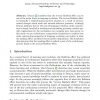Free Online Productivity Tools
i2Speak
i2Symbol
i2OCR
iTex2Img
iWeb2Print
iWeb2Shot
i2Type
iPdf2Split
iPdf2Merge
i2Bopomofo
i2Arabic
i2Style
i2Image
i2PDF
iLatex2Rtf
Sci2ools
129
Voted
ECAL
2007
Springer
2007
Springer
How Does Niche Construction Reverse the Baldwin Effect?
Deacon [1] considers that the reverse Baldwin effect can be one of the major forces in language evolution. The reverse Baldwin effect is essentially a redistributional process of genes as a result of environmental changes which mask and unmask selection pressures. Although Deacon indicates that in the case of language evolution, niche construction is deeply involved in masking and unmasking processes, neither specific explanations for the mechanism nor examples have been given. In this study we use evolutionary computation simulations to explore how niche constructing properties of language evolution can induce at least the masking effect, and hence lead to genetic degradation. The simulation demonstrates that the masking effect is indeed a part of the evolutionary process found in the normal Baldwin effect.
Artificial Intelligence | ECAL 2007 | Language Evolution | Normal Baldwin Effect | Reverse Baldwin Effect |
| Added | 14 Aug 2010 |
| Updated | 14 Aug 2010 |
| Type | Conference |
| Year | 2007 |
| Where | ECAL |
| Authors | Hajime Yamauchi |
Comments (0)

